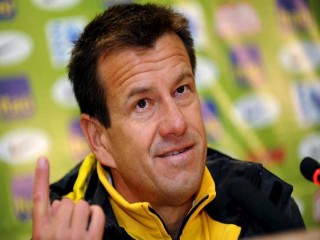
Dunga biography
Date of birth : 1963-10-31
Date of death : -
Birthplace : Ijui, Brazil
Nationality : Brazilian
Category : Sports
Last modified : 2010-05-03
Credited as : Football manager, Brazilian national team, World Cup
0 votes so far
Career
At the club level, Dunga played for Internacional (1980-84, 1999-2000), Corinthians (1984-85), Santos (1985-87), Vasco da Gama (1987), Pisa (1987-88), Fiorentina (1988-92), Pescara (1992-93), VfB Stuttgart (1993-95) and Jubilo Iwata (1995-98).
Internationally, Dunga played 91 times for Brazil, scoring six goals. His international career began in 1983 at the Sub-20 World Cup. Dunga captained the young Brazilian squad, winning the tournament against Argentina in the final. A year later, he helped Brazil to win a silver medal at the 1984 Summer Olympics in Los Angeles, California. Dunga then started to get calls for Brazil's main squad, winning the 1989 Copa América by defeating Uruguay at the Maracanã Stadium.
In 1990, he was a starter for Brazil at the World Cup. After a lackluster tournament and the subsequent elimination in the second round by arch rivals Argentina, Dunga was held responsible more so than his teammates for the worst campaign at a World Cup since 1966. In the following years, he would be consistently targeted by Brazilian press due to his supposedly thuggish style of playing. This period in Brazil's football history was called "Era Dunga," as according to fans and journalists he symbolized the less than thrilling, slow, and defensive style of the team. In spite of that, Brazil's new coach Carlos Alberto Parreira kept Dunga as one of the starting XI throughout the 1994 World Cup Qualifiers and Finals.
Raí actually started the 1994 World Cup as Brazilian captain but after a series of poor performances, he was dropped altogether for Mazinho. Dunga took the captaincy and went on to lift the trophy. Dunga had redeemed himself in the eyes of the press and fans alike, and ever since has been considered a symbol of heart and determination.
Four years later, although playing in the lower standard J. League in Japan, he captained Brazil once more to the final where they lost to France.
Dunga played the anchor role in midfield extremely effectively. Many other players in this position lunged into tackles and put themselves about, but Dunga rarely went to ground to make a tackle, instead using his anticipation and timing. His passing ability was also second to none, always starting a fresh attack and rarely wasting it.
In 1994, he often served as the captain of the team. Dunga scored the third penalty kick in the finals against Italy. He assumed the captain role for the next four years until the 1998 FIFA World Cup. The 1998 tournament was notable for the lack of teamwork. It was often visible as Dunga got into a fight with teammate Bebeto in the first round match against Morocco, forcing the rest of the team to break them up. Dunga also scored in the fourth penalty kick in the shootout eventually won by Brazil against the Netherlands in the semi-finals.
Dunga was one of those considered to replace Vanderlei Luxemburgo in 2000 as the Brazilian national coach. The reason why Dunga turned down his offer was his dislike of the way the Brazilian Football Confederation (CBF) was organized and managing their affairs.
On July 24, 2006, Dunga was named as the new national coach of the Brazilian national team as a replacement for Carlos Alberto Parreira, even though he has no prior coaching experience at professional level. However, he made an impressive start with Brazil, winning four of his first five matches. Zagallo has recently declared Dunga's work as the head coach of the Brazilian national team is very satisfactory. Dunga has shown that he is a manager in the style of great Brazilian managers such as Luiz Felipe Scolari, the manager during the 2002 FIFA World Cup victorious squad.
His first match in charge was against Norway which was played in Oslo on August 16; the game ended in a 1-1 draw. His second match was held against arch rivals Argentina on 3 September in Arsenal's new Emirates Stadium in London, in which Brazil defeated Argentina by a 3-0 scoreline. On September 5, they defeated Wales 2-0 at Tottenham Hotspur's White Hart Lane ground. They later defeated Kuwaiti club Al-Kuwait 4-0, Ecuador 2-1, and Switzerland 2-1.
Unlike Parreira, Dunga has focused on the task of unemphasizing all players and treating them as equals. He did not just look for players on popular clubs, such as AC Milan, FC Barcelona, and Real Madrid but looked at the whole scope of Europe, finding individual talents such as Daniel Carvalho, Vágner Love, and Dudu Cearense of Russian club CSKA Moscow. He also looks for players from local Brazilian clubs such as Corinthians, Flamengo, and São Paulo FC. Of the former "Magic Quartet," Ronaldinho and Kaká were the only players who had a place in the Brazilian national side on those matches, until the next year when Adriano was called back in the squad for a friendly against Portugal, which Brazil lost 0-2. Dunga is yet to select the last member of the Magic Quartet, Ronaldo. In 2007, Dunga managed Brazil to their second straight Copa América title by beating arch-rivals Argentina in the final 3-0, who were heavily favored to win against a weaker Brazil squad. Dunga's squad also won the 2009 FIFA Confederations Cup in South Africa on June 28, 2009. The team came back from a 2-0 deficit against the United States to emerge victorious from a Lúcio header in the 84th minute that made the score 3-2.
















